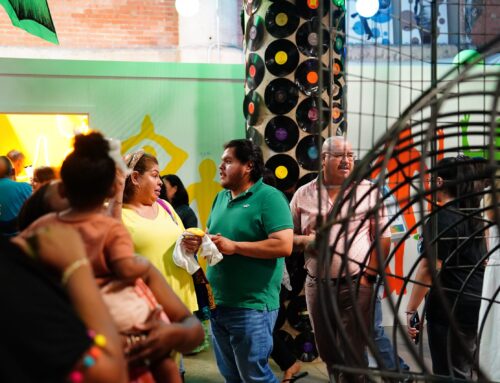As our neighborhood grocer, he once gave us great service and friendly smiles — now, in his family’s time of need, he’s getting it back in droves
Grocery shopping should be fun.
That was Russell Plunk’s philosophy during his 12 years as manager of the Minyard’s at Gaston and Abrams. He greeted regular customers by name, offered their children ice cream and cookies, and took pleasure in startling shoppers by getting on the intercom system and asking security to keep an eye on them.
People in our neighborhood knew they could count on Plunk. One neighborhood caterer remembers him carrying groceries to her car and ordering any spice she requested.
“If they needed something, I tried to get it — even if it meant going down the street to a competitor and bringing it back to our store,” Plunk says. “My thought was that it’s a neighborhood store. I was just in charge of running it for them.”
His accommodating attitude extended beyond Minyard’s walls. Shoppers recall him coming up with 20 lunch boxes for area schoolchildren on five minutes’ notice, and donating cardboard cutouts and event tickets to classrooms.
“A lot of times, kids just didn’t have things, and I tried to take care of them,” he says.
No one who knew Plunk then could have imagined that the jovial, energetic grocer they depended on would soon be the one needing help. But a few months after a company promotion took him away from the Lakewood Minyard’s, he began experiencing headaches. He attributed them to sinuses until one day last May, when his cell phone rang. Reaching into his pocket to answer it, he couldn’t feel his hand. A few days later, he and his wife, Lisa, were driving home when Plunk told her his headache was so painful that he needed to go to either the doctor or the hospital — and fast.
“I just don’t complain, and I knew something was wrong,” he says.
Lisa, a nurse at Baylor University Medical Center, thought he was having a brain aneurism. But a CT scan revealed a large mass on the right side of Plunk’s brain. It was the most malignant, invasive and developed type of brain cancer. But after a successful surgery, he went home and returned to work within six weeks.
“Life was very normal,” Lisa says. “He never slowed down for a second.”
The normalcy lasted until December 5. Plunk had brought home his daughters, 14-year-old Katie and 2-year-old Claire, and was hanging laundry on the clothesline while chatting with a neighbor when his speech began to slur. When he went inside looking for Lisa, the entire left side of his face and body began seizing. Once at the hospital, an MRI found another lesion, and all tests pointed toward another tumor. He and Lisa agreed to another surgery, but when Plunk woke up, he couldn’t move anything on his left side.
It was during those dark days following the surgery that friends and neighbors banded together and decided the family would not struggle alone. Plunk went home in mid-January and had to rely on Lisa for care around the clock. During that first week, Lisa found herself at neighbor Teena Zihlman’s house having a “mini mental breakdown,” as she jokingly refers to it now.
“She couldn’t cope, so we sat down and I said, ‘Tell me what you need,’” Zihlman says.
All Lisa had to do was say the word, and the help started pouring in. It still does. Meals are delivered to the Plunks’ house every other night. Laundry is washed on a regular basis. Someone provides lawn service every week. Another donates cleaning services every other week. People volunteer to watch Claire and take care of Plunk while Lisa is at work. A friend comes over for two hours every morning so Lisa has a chance to shower and get dressed. Another friend thought Plunk would be more comfortable in an overstuffed recliner, so he rented one and took it to the house.
“If a light bulb goes out, they’re here,” Lisa says. “Anytime they see a need, it’s boom — they take care of it. I’m so overwhelmed and touched by that.”
The volunteers are the Plunks’ neighbors, family members, friends from St. Pius X, Bishop Lynch parents whose children go to school with Katie and, of course, people who know him from Minyard’s. Zihlman refers to everyone as “the village.”
“Changing a light bulb is not a big deal, but to the Plunks it is,” says Gray Huggins, who takes care of the family’s computer problems. “People are giving based on what they can do. To give a little bit extra, it almost seems insignificant until you see the joy on their faces.”
The reason they give, Zihlman says, is because of their love for the family. Plunk is the kind of man who would give someone the shirt off his back, she says, and despite his sickness, that hasn’t changed. While he was in the hospital after the most recent surgery, a young man across the hall in a caged bed became violent, and Plunk calmed him down so the nurses could return to the room.
“Here’s Russell, he’s obviously in a world of hurt, but he’s reaching out of his hospital bed to someone he doesn’t even know,” Huggins says.
Plunk is currently undergoing rehabilitation to relearn how to walk and use his left arm. His goal is to regain full mobility because “without a goal, people don’t get where they’re going,” he says.
“That’s what it’s all about — taking care of each other,” Plunk says. “We’ve rallied behind other people, and they’re just rallying behind us right now. We couldn’t do it without them.”





